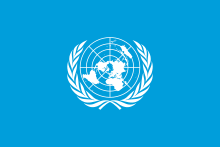
Back الأهداف الإنمائية للألفية Arabic সহস্ৰাব্দ উন্নয়ন লক্ষ্য Assamese Minilliyin İnkişaf Məqsədləri Azerbaijani Bakelenda Yiriwa Kuntlenaw BM সহস্রাব্দ উন্নয়ন লক্ষ্যমাত্রা Bengali/Bangla Objectius de Desenvolupament del Mil·lenni Catalan Rozvojové cíle tisíciletí Czech 2015-målene Danish Millenniums-Entwicklungsziele German Στόχοι Ανάπτυξης Χιλιετίας Greek

In the United Nations, the Millennium Development Goals (MDGs) were eight international development goals for the year 2015 created following the Millennium Summit, following the adoption of the United Nations Millennium Declaration. These were based on the OECD DAC International Development Goals agreed by Development Ministers in the "Shaping the 21st Century Strategy". The Sustainable Development Goals (SDGs) succeeded the MDGs in 2016.
All 191 United Nations member states, and at least 22 international organizations, committed to help achieve the following Millennium Development Goals by 2015:
- To eradicate extreme poverty and hunger
- To achieve universal primary education
- To promote gender equality and empower women
- To reduce child mortality
- To improve maternal health
- To combat HIV/AIDS, malaria, and other diseases
- To ensure environmental sustainability[1]
- To develop a global partnership for development[2]
Each goal had specific targets, and dates for achieving those targets. The eight goals were measured by 21 targets. To accelerate progress, the G8 finance ministers agreed in June 2005 to provide enough funds to the World Bank, the International Monetary Fund (IMF) and the African Development Bank (AfDB) to cancel $40 to $55 billion in debt owed by members of the heavily indebted poor countries (HIPC) to allow them to redirect resources to programs for improving health and education and for alleviating poverty.
Interventions evaluated include (1) improvements required to meet the millennium development goals (MDG) for water supply (by halving by 2015 the proportion of those without access to safe drinking water), (2) meet the water MDG plus halving by 2015 the proportion of those without access to adequate sanitation, (3) increasing access to improved water and sanitation for everyone, (4) providing disinfection at point-of-use over and above increasing access to improved water supply and sanitation (5) providing regulated piped water supply in house and sewage connection with partial sewerage for everyone (Hutton, G. Evaluation of the Cost and Benefits of Water and Sanitation Improvements at the Global Level, 2004 WHO-Geneva)
Critics of the MDGs complained of a lack of analysis and justification behind the chosen objectives, and the difficulty or lack of measurements for some goals and uneven progress, among others. Although developed countries' aid for achieving the MDGs rose during the challenge period, more than half went for debt relief and much of the remainder going towards natural disaster relief and military aid, rather than further development.[citation needed]
As of 2013, progress towards the goals was uneven. Some countries achieved many goals, while others were not on track to realize any. A UN conference in September 2010 reviewed progress to date and adopted a global plan to achieve the eight goals by their target date. New commitments targeted women's and children's health, and new initiatives in the worldwide battle against poverty, hunger and disease.
Among the non-governmental organizations assisting were the United Nations Millennium Campaign, the Millennium Promise Alliance, Inc., the Global Poverty Project, the Micah Challenge, The Youth in Action EU Programme, "Cartoons in Action" video project and the 8 Visions of Hope global art project.
- ^ [1], United Nations Millennium Development Goals website, retrieved 21 September 2013
- ^ Background page, United Nations Millennium Development Goals website, retrieved 16 June 2009
© MMXXIII Rich X Search. We shall prevail. All rights reserved. Rich X Search